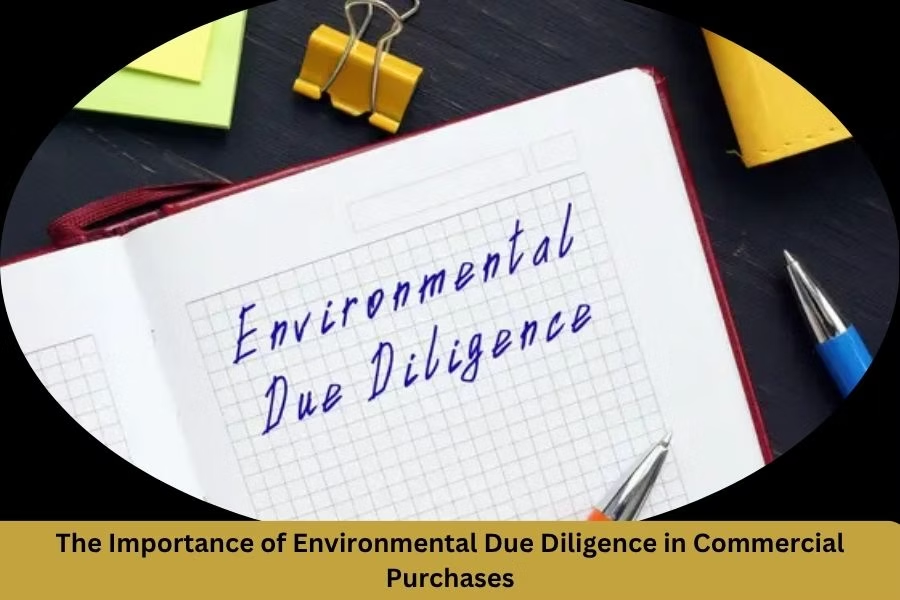When investing in commercial real estate, there’s more at stake than location, aesthetics, and price. One critical—yet often underestimated—component is environmental due diligence. It’s the process that ensures buyers understand the potential environmental liabilities tied to a property before the deal is closed.
The Real Estate Law Firm consistently advises clients not to skip this vital step. Why? Because failing to assess the environmental status of a commercial property can lead to regulatory fines, cleanup costs, property devaluation, or even future lawsuits. Let’s break down why environmental due diligence is essential and how it can save you from disastrous outcomes.
Learn more on our Commercial Real Estate Services page.
What is Environmental Due Diligence?
Environmental due diligence refers to the investigation and assessment of a property to identify potential or existing environmental contamination liabilities. It typically includes reviewing records, inspecting the property, and interviewing current and past owners or occupants.
The process is most commonly conducted during commercial transactions, especially those involving land that may have had industrial, automotive, or chemical use. At The Real Estate Law Firm, we ensure that our clients are well-informed about the types of due diligence available, including:
Phase I Environmental Site Assessment (ESA): A non-intrusive investigation that involves records review, interviews, and site inspection.
Phase II ESA: Conducted if Phase I uncovers concerns. It includes soil, groundwater, and building material testing.
Phase III ESA: Focuses on remediation planning and execution of contamination is confirmed.
Why Environmental Due Diligence is Crucial
1. Avoid Legal Liability
Under laws like the Comprehensive Environmental Response, Compensation, and Liability Act (CERCLA), a buyer can become liable for the cleanup of hazardous substances—even if they didn’t cause the contamination. Environmental due diligence can help establish the “innocent landowner” defense, protecting you from legal accountability.
2. Protect Property Value
Contaminated properties tend to have reduced market value. If a property has soil or groundwater issues, the cost of cleanup may outweigh its future worth. The Real Estate Law Firm routinely advises buyers to conduct Phase I and II assessments to protect their investment from depreciation.
3. Secure Financing
Most lenders require environmental assessments before approving loans for commercial property purchases. Banks want to ensure the collateral (the property) isn’t at risk of being devalued by environmental problems.
4. Facilitate Insurance Coverage
Environmental risk insurance providers often mandate due diligence to qualify for policies. Failure to do so might limit your ability to claim damages related to environmental issues.
5. Preserve Business Operations
Environmental hazards can disrupt operations, especially if the business involves food, hospitality, or manufacturing. Hazardous materials, mold, or lead paint could pose significant health and safety risks. Knowing this beforehand helps with contingency planning.
6. Understand Compliance Requirements
Environmental due diligence helps new property owners understand what regulatory obligations they may inherit. These can include permits for air emissions, wastewater discharge, or hazardous waste management.
Who Needs Environmental Due Diligence?
Environmental due diligence isn’t just for heavy industry or manufacturing sites. It applies to a wide variety of commercial property types, including:
-
Gas stations and auto repair shops
-
Warehouses and distribution centers
-
Dry cleaners
-
Former industrial buildings
-
Properties near railways, landfills, or chemical plants
At The Real Estate Law Firm, we also recommend environmental assessments for seemingly low-risk properties, especially if there’s a chance of historical contamination or neighboring environmental hazards.
Unsure if your property needs review? Meet our experts.
When Should You Perform It?
Environmental due diligence should occur during the early stages of a commercial real estate transaction—ideally during the contract negotiation period or inspection contingency window. Delaying it can limit your legal options or force you to absorb unanticipated costs.
How The Real Estate Law Firm Helps
Our legal team works hand-in-hand with environmental consultants and engineers to ensure that your due diligence process is thorough and legally sound. We assist with:
-
Reviewing ESA reports
-
Negotiating contract contingencies based on findings
-
Advising on indemnity clauses
-
Coordinating with environmental regulators
-
Guiding remediation planning if contamination is found
By involving The Real Estate Law Firm early, buyers reduce risk and gain leverage in negotiations.
Real-World Scenarios: Why Due Diligence Pays Off
Case Study 1: The Hidden Fuel Tank
A buyer interested in a commercial retail property conducted a Phase I ESA, which revealed a buried fuel tank used by a previous tenant. The tank was corroding, leaking into the groundwater. Because the issue was uncovered during due diligence, the buyer negotiated for the seller to cover the cleanup costs—saving hundreds of thousands in future liabilities.
Case Study 2: Dry Cleaner Dilemma
Another client purchasing a strip mall discovered that a long-defunct dry cleaner had contaminated the soil with perchloroethylene. Thanks to proper legal guidance from The Real Estate Law Firm, they renegotiated the purchase price and escrowed funds for remediation—avoiding regulatory penalties and litigation later.
Conclusion
Environmental due diligence isn’t a luxury—it’s a necessity in commercial real estate purchases. It protects your legal standing, financial investment, and operational future. Whether you’re buying a small warehouse or a major shopping center, The Real Estate Law Firm ensures you move forward with clarity and confidence.
Contact us now to reduce legal and financial risks.
Frequently Asked Questions (FAQs)
-
What is the difference between Phase I and Phase II ESA?
Phase I involves a records review, site inspection, and interviews. Phase II includes physical testing like soil and water sampling if Phase I identifies potential issues. -
Who pays for environmental due diligence?
Typically, the buyer pays, but costs can sometimes be negotiated with the seller—especially if issues are discovered. -
How long does a Phase I ESA take?
Usually between 2 to 4 weeks, depending on the property and accessibility of historical records. -
Is environmental due diligence legally required?
Not always, but it is strongly recommended. Skipping it can expose you to significant liability. -
Can a deal fall through due to environmental findings?
Yes. If contamination is found and remediation costs are too high, buyers often walk away or renegotiate. -
What happens if contamination is discovered after purchase?
You may be liable for cleanup unless you can prove you conducted adequate due diligence and qualify as an “innocent landowner.” -
Does The Real Estate Law Firm help with environmental assessments?
Yes. We coordinate with trusted environmental consultants and ensure all legal implications are addressed during the transaction. -
Are environmental assessments public record?
Some are, especially if they result in regulatory enforcement. However, many assessments conducted privately remain confidential. -
What is the cost of a Phase I ESA?
It generally ranges from $2,000 to $5,000, depending on the property size and complexity. -
Should I get environmental due diligence on undeveloped land?
Yes, particularly if it’s near industrial sites, landfills, or has a history of contamination. Prior use can impact future development and liability.




